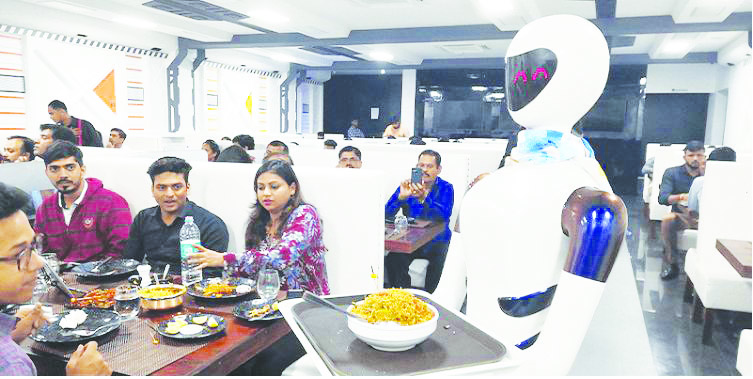REMOTE DINING: It has already started. You may now being served in the best restaurants not by pretty hostesses but by robot hostesses
By Laura Curtis
Contrary to the general fear that artificial intelligence will reduce the number of jobs, it will actually be a big boost. After all someone has to ensure that the AI control gadgets do not wax your back instead of your face!
For centuries, consumers and workers have benefited from innovation and the adoption of new technologies. That has required training, upskilling and education on how to most effectively use and operate those technologies. Recently, automation and artificial intelligence (AI) has caused concern as many fear emerging technologies could lead to a loss of jobs; that robots will replace them. However, during the current COVID crisis, where job loss has been caused by a global pandemic, we’re seeing more clearly what the future will look like – robots supporting jobs not eliminating them.
The number of job losses caused by COVID is unprecedented. According to data from the US Department of Labor, 1 in 5 Americans have filed first-time claims for unemployment benefits. The most recent weekly figures from April 25-May 2 shows an additional 3,169,000 claims. Overall, the US lost 20.5 million jobs in April which is the most drastic decline since 1939 when the government first started tracking unemployment rates. Combine unemployment numbers with the world market decline and it becomes clear that the economy all but stops without a human workforce.
While there are no definitive numbers on how drastically automation is anticipated to impact employment globally, it is not as rapid or severe in comparison to the current global crisis. In December 2017, the McKinsey Global Institute released a study estimating the number of jobs impacted globally would be approximately 15% on average over a ten-year period. This ramp-up period would allow the 3-14% of the global workforce the study suggests will be impacted to enter workforce retraining programs and learn new skills that will aid the technology as it evolves.
Unlike the estimated slower progression of AI’s impact on the global job market, the pandemic caused a decrease in the human workforce overnight and made the use of machines more appealing. In a world that is social distancing, society is relying more than ever on AI to do jobs that humans simply cannot or should not do at this time. From hospitals to retail, machines are used to scrub floors and eliminate traces of the coronavirus through ultraviolet light. Robots in South Korea have been used to measure temperatures and distribute hand sanitizer and in China, ambulances are assisted by AI to rush through traffic. Groceries, meals, and medical supplies are delivered by self-driving cars, trucks and sidewalk robots.
AI is also key in the desperate search for medical intervention. A recent New York Times article featured a London startup, BenevolentAI, using the technology to speed read scientific literature in search of possible treatments for COVID-19. Within two days, the technology found a potential drug that will soon be tested in an accelerated clinical trial. As the article highlights, AI tech firms have shifted their focus to COVID-19 in an effort to aid —not replace – the human experts.
Even in the retail space, the lessons of AI during COVID are fascinating. While many industries have had to eliminate positions, many tech companies who already rely on automation are hiring. While companies, for example, are relying on robots for heavy lifting and transporting packages within the warehouse, fine motor skills of humans are still required and irreplaceable. Industries that have relied on machines and robots for decades shut down and are slowly reopening because the humans that operate the machinery are still necessary and susceptible to contracting disease even though the machines they operate are not.
While robots can assist nurses and doctors by providing diagnostic care, they cannot replace the essential skills that only humans can provide. Doctors and nurses must have empathy in order to offer great bedside care and critical thinking skills are vital to ensuring patients continue to heal. And of course, doctors must make life and death decisions that we simply do not want machines making. “[A]s the situation now is clearly demonstrating, we absolutely very much need humans to understand larger situations and make decisions,” Julie Carpenter, a roboticist and research fellow at the Ethics and Emerging Sciences Group at Cal Poly San Luis Obispo recently said in a Wired article.
As eloquently stated in that same article, “Overestimating robots and AI underestimates the very people who can save us from this pandemic: Doctors, nurses, and other health workers, who will likely never be replaced by machines outright. They’re just too beautifully human for that.”
CompTIA has established an Artificial Intelligence Advisory Council to identify opportunities to accelerate the adoption of AI and machine learning technologies while ensuring workers have the proper training and upskilling needed. As this pandemic has made clear, while AI can accelerate the growth of businesses, it will be through workers working in tandem with technology to drive businesses and innovation forward.
Courtesy:www.comptia.org
